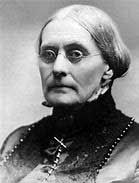July 2020-Women’s Rights and Susan B. Anthony

A woman’s place was in the home.
Susan Brownell Anthony helped make it possible for a woman’s place to be in the home, office, statehouses, military, outer space and other places she might want to be.
Anthony (1820–1906) was a pioneer in the women’s suffrage movement in the United States. Her work helped pave the way for the 19th Amendment to the United States Constitution. Also known as the Susan B. Anthony Amendment, the 19th Amendment granted women in the United States the right to vote when it was adopted on Aug. 26, 1920.
“It is not easy to realize that when Miss Anthony, a young woman of 33, started out as a pioneer reformer, with Elizabeth Cady Stanton, woman’s place was so definitely in the home that Miss Anthony was still in public disfavor for having dared to voice her opinion at a local temperance meeting. Only men were supposed to talk in meetings,” stated an article in the Feb. 14, 1937, Washington, D.C. Evening Star for the 117th anniversary of Anthony’s birth.
“At that time the statute books of the United States carried many old laws which had come from old English law of the middle ages regarding women. If a married woman worked it was not legal for her to receive her own wages from her employer for that right belonged to her husband.
“If the husband chose to apprentice the children to work and live in strangers’ homes without her consent, the law was on his side. He might even will them away after his death. The woman who dared to earn her living in any other work beside keeping boarders or teaching school found it difficult to maintain her reputation for respectability. Inasmuch as young women were not provided with the same educational advantages as their brothers, there was little prospect for their success in any career requiring training. As a teacher young Susan B. Anthony had worked for one-fourth of the salary given men occupying similar positions.”
Other tributes to Anthony in the Evening Star stated that, “Unmarried women were ‘spinsters,’ usually dependent on family generosity … Wives could not hold property in their own names and children, in case of divorce, belonged exclusively to the father.”
“Today, due largely to Miss Anthony’s efforts, such conditions seem unbelievable. Suffrage is universal. Women attend our greatest universities. There are more than 11,000,000 women employed in every conceivable occupation and hundreds of thousands of feminine lawyers, physicians and ministers. In the French cabinet, American Congress, English Parliament and council halls of Geneva women are steadily finding new opportunities for service,” stated a 1936 article in the Evening Star.
Anthony grew up in New York. Her father, Daniel, was a Quaker who raised his children in the belief that women were equal to men and encouraged his children to be self-supporting. After her family was financially ruined during an economic downturn, Susan obtained a teaching position to assist her family financially.
The Anthony family was involved in the most important reform movements of the times – antislavery, temperance and women’s rights.
The prejudice Anthony met everywhere against feminine participation in antislavery and temperance movements convinced Anthony that women could work effectively against slavery and liquor abuses only when they had obtained political and economic rights, stated a 1936 article in the Evening Star about Anthony.
“Like every advocate of change she met bitter opposition. ‘Hen’ and ‘unsexed monster’ were her usual titles. Tomatoes and rotten eggs often greeted her speeches,” according to the Evening Star.
In a telegram from Minneapolis in October 1889, Anthony stated, “The state (South Dakota) is bound by its constitution to submit the question of universal suffrage a year from this time, and we are going to concentrate all our forces in that state from this time on. All the best speakers all the best workers in the woman’s suffrage ranks in the United States are to be turned into the field in South Dakota.”
This news resulted in the comment in the Wichita Eagle, “Heaven help Dakota and her people.”
Despite this comment, people came to see and hear Anthony when she came to South Dakota.
“Everybody wants to see Miss Anthony, and every one does who gets to the meetings in time or can find standing room or gaze at her from the windows,” a suffrage worker wrote to The Woman’s Journal in June 1890.
Despite the efforts of Anthony and other suffrage leaders, the amendment that would have enabled South Dakota women to vote in all elections was defeated at the Nov. 4, 1890, election.
Anthony died at her home in Rochester, N.Y., on March 13, 1906. Fourteen years after her death the cause in which she had spent more than 50 years won its greatest victory when the 19th Amendment became the law of the land.
This moment in South Dakota history is provided by the South Dakota Historical Society Foundation, the nonprofit fundraising partner of the South Dakota State Historical Society at the Cultural Heritage Center in Pierre. Find us on the web at www.sdhsf.org. Contact us at info@sdhsf.org to submit a story idea.
